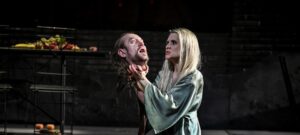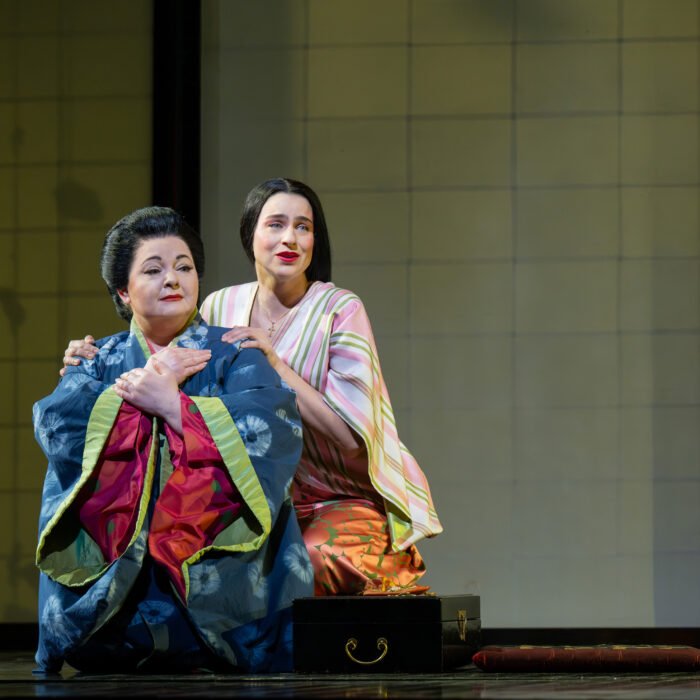
Brno National Theater 2023-24 Review: Salome
Linda Ballová’s Stand Out Performance Underpins Dramatic Presentation
By Alan Neilson(Photo: Marek Olbryzmek)
Linda Ballová’s Stunning Performance
For the Brno National Theatre’s production, it was the relatively unknown Slovakian Linda Ballová who was cast in the role, and the initial impressions were not particularly encouraging. She entered the stage dressed in an insipid green dressing gown, which did absolutely nothing to help her stand out from those about her, and her voice, although technically correct, lacked presence. This proved to be only a short teething problem, and her performance soon developed into a captivating, dramatically powerful interpretation.
Her major confrontation with Jochanaan was expertly crafted to bring out the complete lack of any connection between them. He has nothing but contempt and hatred for her behavior, while she is obsessed with his lips. They barely listened to each other’s words while voicing their own feelings. Ballová’s construction of the vocal line was expressively strong; her colorful and dynamic inflections were brilliantly woven into her presentation, adding depth and strength to her emotionally extreme delivery. It also allowed her to display her vocal agility as she moved the voice freely and securely, climbing smoothly and forcefully into her upper register while soaring above the orchestra, spinning out beautifully long lines, and indulging in audacious leaps underpinned by her frustrations and emotional excess.
She was always attentive to Salome’s state of mind, both in the way she acted out the part and in the nuance with which she engaged with the vocal side of her performance. When Herod tries to persuade her not to go ahead with her demand for Jochanaan’s head, the ice-cold tone with which she was able to imbue the words “Gib mir den Kopf des Jochanaan,” as she stood impassively gazing out towards the audience, was chilling.
“Ah! du wolltest mich nicht deinen Mund küssen lasse” was performed sitting alone at the front of the stage, her face and clothes covered in blood. Her rendition was emotionally overwhelming, as she poured everything into it. The contrasts she was able to bring to the piece were fascinating and captured her mental disconnection with reality. The voice moved calmly and sprang forth erratically without missing a heartbeat. Her ability to hold the line as the voice meandered in different directions was superb, and the consistent quality of the voice as she soared above the orchestra was simply wonderful.
A Strong Cast Throughout
Jaroslav Březina was a weak, pathetic Herod, who was at the mercy of his lecherous passions, which he voiced with a wanton and lascivious fervor, showing off his expressive, high-flying tenor to good effect. He also successfully highlighted his common origins with his crude and unsophisticated behavior and dress. During Salome’s dance, he stared leeringly, overcome with lust and totally incapacitated. Although he operated well outside the normal moral framework, Salome’s demand for the head of the prophet was too much for his fragile mentality, which he expertly captured in his desperate, pleading tones as he begged Salome to reconsider before eventually collapsing in a heap. It was a role that appeared to suit Brezina well.
Herodias is a great role for any female singer wishing to show off their acting skills, and I doubt there have been many as compelling as that of Eva Urbanová. Hers was a Herodious, who had descended into a psychological abyss in which the normal rules of acceptable behavior had long since been abandoned. She had a disdain, verging on contempt, even hatred, for her husband, Herod, attacking him on every possible occasion, brilliantly intoning the line with unconcealed malice. But it was her transformation into an eerily calm, almost contented observer that sent a chill down the spine. As Salome writhed around the stage with the head of Joachannan and Herod lay motionless in the corner, she sat eating a healthy-looking salad, completely untroubled by the horror unfolding around her.
Baritone Birger Radde created a strong impression as the intolerant and intense Jochanaan, successfully capturing the certainty and fervor of his faith. His voice possesses an attractive timber. It is secure, firm and well-grounded, and when singing from his imprisonment in the cistern, he was able to project his voice so that it rang out, his authoritative and defiant tone echoing resonantly across the stage. When Salome demanded to see him, he was defiant and dismissive, barely even bothering to look at her, coating his voice with scorn and contempt to the point that his disgust for her was palpable; not that this bothered Salome, who became more entranced by him.
The tenor Vít Nosek added to the instability of the situation with his effective portrait of Narraboth. Suitably besotted, he could not keep his eyes off Salome, but his jerky physical actions gave the impression of someone who had lost control. His suicide was excellently staged; no one even noticed and certainly didn’t care. Vocally, he was secure and captured his character’s mental instability successfully.
The five Jews, played by tenors Zbigniew Malak, Pavel Valenta, Petr Levíček, Michael Robotka and baritone Kornél Mikecz, were an energetic and noisy bunch, arguing animatedly with each other.
The minor roles were all given strong performances. Mezzo-soprano Jana Hrochová produced a clearly defined reading of Herdodes’ page. Bass Josef Škarka convinced in the roles of the first Nazarene and first soldier; tenor Zoltán Korda was a worthwhile second Nazarene; bass David Nykl was convincing as the second soldier and the Capadocian; and mezzo-soprano Jitka Zerhauová gave a tidy interpretation of the Slave Girl.
The conductor, Marko Ivanović, produced a mixed reading from the Janáčkovy Opera Orchestra. On the positive side, he captured the dramatic side of the score perfectly and was sensitively attuned to the onstage action. It was also a vibrant performance that successfully brought out the dynamic contrasts to good effect and ensured the overall arc of the music was well-managed. However, he failed to highlight the musical contours, especially in the early scenes; the motifs, which give the music a Middle Eastern feel and conjure up the warmth of the desert, slipped by, so that the heat and the sultry atmosphere were largely missed. Fortunately, this aspect of the performance improved over the course of the opera.
Director David Radok’s Clear Characterizations
The director, David Radok, did a brilliant job in delving deep into the cores of the characters in order to build nuanced yet well-defined personalities, even in the cases of the minor roles, to uncover their mental instabilities, which he then highlighted through imaginative devices, ranging from Narraboth’s physical movements to Herodias’ calm demeanor as she ate supper while Salome writhed around on the floor with Jochanaan’s head. The overall result was a completely bizarre environment in which anything was permissible, provided the person possessed the necessary power.
The scenographer, Dragan Stojčevski, created a single set consisting of an all-black stage with a window at the back, opening onto a room in the palace where Herod’s birthday celebration was taking place. In the front, to one side, there was the cistern with a metal cable to raise and lower Jochanaan. Together with Přemysl Janda’s subdued lighting, it created a dark, oppressive atmosphere in which the party in the background was occasionally used to create a sharp contrast with, or to magnify, the grotesque behavior in front, as when the guests appeared to be engaged in a dance of death.
Zuzana Ježková’s costume designs were modern in design, with the exception of Herod’s, who had a toga added to his military costume. Although they fitted comfortably with the staging, their impact was fairly tepid and did little to promote the drama.
At the centre of the opera is the famous “Dance of the Seven Veils.” However, it turned out to be fairly disappointing. The idea behind it was a good one. Rather than dancing just for Herod or in front of a small company of people, Salome was surrounded by Herod and his dinner guests, along with a few servants. She moved between them, taunting them with an air of defiance. However, Andrea Časraková’s choreography did not work. Lacking coordination, it moved from one idea to the next, so that at times Salome appeared to be transitioning between ideas. It gave the impression of having no overall conception and was often not in sympathy with the orchestra.
This may not have been a perfect production, but it was very, very good. This was as intense a production of Strauss’ masterpiece as one may have witnessed. Everything was neatly coordinated to bring out the dysfunction of the characters and the debauched, amoral state of Herod’s court. It was a gripping piece of theatre from start to finish, and Ballová’s performance was breathtaking.



